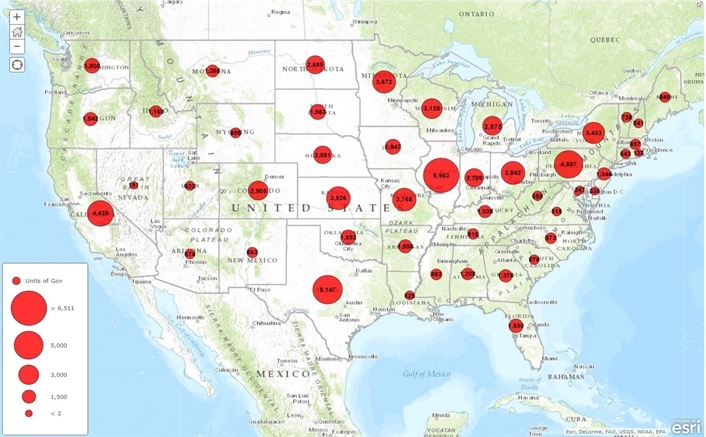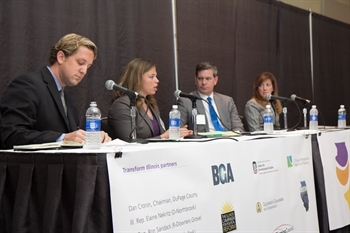
Metropolitan Planning Council
Transform Illinois partners and speakers gathered to celebrate a successful and inspiring conference.
By now you’ve heard the sad tale. Illinois has so many units of government that if we got rid of half of them, we’d still have more than all but a handful of other states. 6,963 in total. Fifty-four units of government per 100,000 people in Illinois. Some are big—a county, a city, a village—and some are small, even tiny—a lighting district with no staff and a budget in the tens of thousands of dollars, a school district with a single school.

Units of government by state. Illinois has 6,963 units of government, 54 units per 100,000 people.
This can be confusing for even the most civically engaged voter. As we examined back in September, in some areas of DuPage County a resident on one side of a road can have 16 local units of government to engage in and support, and literally across the road their neighbor has eight. This can produce very different levels of service of core government functions, but also different tax burdens, confusion (or malaise) at the polls and likely frustration for everyone involved.
So what to do? We’re not sure if it’s the sheer number of units of government out there that is really the problem, or the effects of overgovernance (too many folks trying to handle one problem) or undergovernance (problems that fall between the cracks and don’t get addressed). The first requires consolidation or elimination of units of government—which as we’ve seen can be a tough haul—while the second requires effective service sharing. The latter can work well, but can also be fragile; when staff members or political leaders change, service sharing agreements can sometimes fall by the wayside. We have success stories, as well as failures, on both ends of that spectrum. This conundrum—what’s the impact of all this government, and what do we do about it—is going to be a focus of the Metropolitan Planning Council (MPC) in the years to come. It has to be.
Good news is, we’re not alone. MPC is a founding partner of Transform Illinois, a collaborative of local elected officials, civic organizations and research institutions dedicated to promoting and supporting local government efficiency efforts in Illinois. On Monday, Nov. 2, nearly 150 elected officials, government staffers, business leaders and interested citizens from around northeastern Illinois attended The Efficiency Advantage, held at the University of Illinois at Chicago, to take part in Transform Illinois’ debut event and help us find sensible paths forward.
DuPage County Chairman Dan Cronin and MPC’s own President MarySue Barrett kicked off the event, posing the key question for the day, “How should we transform outdated, redundant, ineffective units of government to deliver high-quality services in the most cost-effective and accountable way?”

Speakers on the Transform Illinois panel discussed challenges and opportunities around government efficiency in Illinois.
Cook County Board President Toni Preckwinkle, as well as a panel of speakers including Better Government Association's Alden Loury, lll. Sen. Linda Holmes (D-Plainfield), Lake County Board Chair Aaron Lawlor, Illinois Chamber of Commerce’s Todd Maisch and Village of Oswego's Assistant Village Administrator Christina Burns, shared their perspectives on that question. If you couldn’t make it, the audio is online. There were a few general consensus points from both President Preckwinkle and the panelists:
- Government efficiency starts at home. Before service sharing or other interjurisdictional partnerships can truly function, each party needs to take measures to understand and optimize their own core functions. That’s as true for Cook County and its STAR system as it is for Oswego, which recently completed a shared services study with the Chicago Metropolitan Agency for Planning’s Local Technical Assistance Program, in partnership with the Village of Montgomery and the City of Yorkville.
- Springfield has a role to play by enabling elected officials and residents to consider consolidations or interjurisdictional agreements (which isn’t always possible now), and possibly by providing incentives for efficiency. Imagine lower interest rates or expedited permitting for infrastructure projects that are undertaken by multiple bordering communities (i.e. water pipes, road reconstruction, bike trails).
- This is going to take time. Essentially, we have the whole history of Illinois to contend with here, and inertia is a powerful, powerful force.

Conference attendees participating in the live poll.
We also live-polled attendees for their thoughts (and conducted follow-up surveys—check back soon for findings from that). Here are some highlights:
- The highest percentages of attendees were employed by the County (25.4 percent), the private sector (20.63 percent), or a nonprofit (17.46 percent), and of the total attendees, more than 51 percent drove alone to the conference.
- The two biggest challenges to overcome are duplicative or inconsistent services across local governments, and the efficiency challenges that come with preventative State regulations and mandates. Attendees acknowledged that they faced these many challenges frequently, ranging from a few times a year to multiple times daily.
- More than half of the attendees believed that the number of units of government are an impediment to democracy. With that, most attendees believed that the most beneficial steps to take in the next one to two years are creating legislation to eliminate these obsolete units of government on a case-by-case basis, and to create service sharing models and templates. Nearly 80 percent of attendees agreed that due to the decline in State funding, service sharing is encouraging. However, collaboration is more likely to occur if the State provides incentives.
The good news is, Transform Illinois and its member are already on the job. The Chicago Metropolitan Agency for Planning encourages applications for Local Technical Assistance from communities looking to share services with neighbors. We’re developing a legislative agenda to pursue enabling authority for more counties to undertake the kind of internal governance assessment that DuPage did through its ACT Initiative. We’re documenting success stories, developing research projects and planning future events on the mechanics of service sharing and other critical how-tos.
That said, the more we know, and the more people that engage, the more steam we can build for what will be an uphill struggle. Whether you were at the conference or not, we’d love your feedback on this six-question survey about challenges and opportunities you see today or in the years ahead. Your responses will shape the work plan and core functions of Transform Illinois, and if you’re interested in learning more about the initiative, drop me a line.
You can reach Josh at jellis@metroplanning.org.